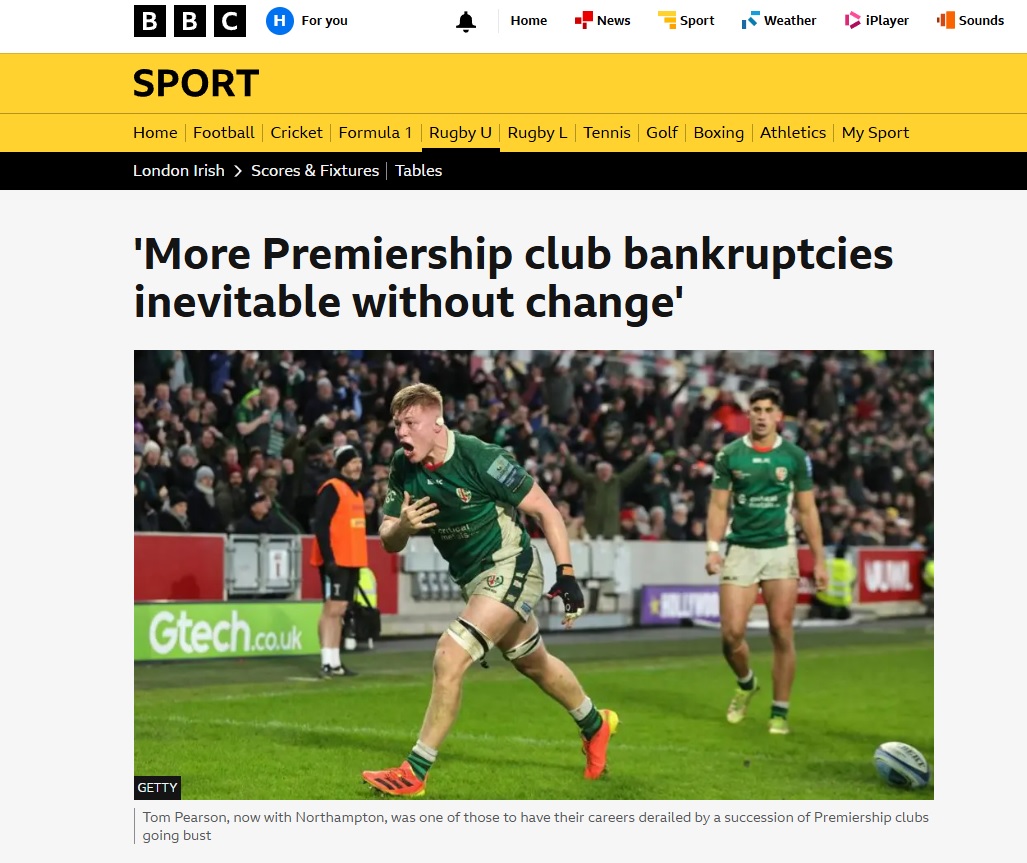By Harry Mottram: The majority of professional rugby clubs are in debt and technically insolvent and it’s only a ‘matter of time’ before another top flight rugby club goes bust. Those are the views of many in the game including London Irish administrator Lee Manning while Gloucester owner Martin St Quinton believes the Premiership set up is flawed. And they have a point since Worcester Warriors, Wasps and London Irish all went bust between September 2022 and June 2023 leaving a hole in the top division of the English rugby pyramid.
Since the game went professional players have naturally been paid – TV money has flowed in along with sponsorship and hospitality revenues crowds have increased. But one thing hasn’t changed since 1995: the number of games a club and their players can play. There are fewer clubs in each league compared to football, with fewer games, more injuries and compared to the top two divisions of soccer the crowds are small in number. That means less money – hence clubs wishing to start holding more money-spinning events like rock concerts in their grounds.
Various reports have shown the dire financial state of rugby union’s top clubs which collectively are in hock to north of £350million. The Leonard Curtis Rugby Finance Report 2024 revealed the finances of the clubs in the top flight – only three: Leicester, Northampton and Gloucester, were in the black while all the others had debts ranging from a modest £1.9m for Sale and an eye-watering £34.8 million for Bristol.
Ian Carrotte of ICSM in Somerset whose business members keep an eye on late payers and potential bad debts said the situation was unsustainable. “Last month in Wales Cardiff Club collapsed owing creditors more than two million pounds. That’s one of the biggest clubs in the Principality and they couldn’t make a profit. They were lucky to be bailed out by the Welsh Rugby Union but not every club has that type of saviour. London Irish, Worcester Warriors and Wasps have all gone bust in recent times. ICSM understands Irish have been bought up and hope to re-enter an expanded Championship, but the point is the game’s financial model doesn’t work.”
He said that back in the day when clubs were amateur or semi-professional there were still fiscal issues due to that problem of gate money. Few clubs could pull in more than 10,000 spectators – and then only for certain games. When Cardiff went bust there was a lively debate online with many calling for the WRU to turn back the clock to the 1970s when Wales dominated the Five Nations despite having players in full time jobs. It was pointed out that even for the top teams three or four thousand were seen as big gates while for lesser teams a few hundred. It was (and still is) the internationals that pack tens of thousands into stadiums.
ICSM’s Ian Carrotte said suppliers had their fingers burnt in the past by rugby clubs like Worcester and Jersey Reds. He said that one solution would be a much lower salary cap on players along with a limited number of players in a squad but clubs would not be keen on the idea. “The RFU introduced a salary cap in 1999,” he said “in order to control inflation and create a level playing field amongst clubs – but it has had a mixed history with accusations of clubs finding ways around the system.”
For suppliers who sell food, programmes, kit and beer to the clubs he said, ‘you need to stick to your credit terms as you would in any other business’ – when Worcester went bust, they owed more than £24 million pounds.
The BBC ran a story this spring on the issue – see https://www.bbc.co.uk/sport/rugby-union/articles/clyz731p3yzo
+++++++++++++++++++++++++++

ICSM CREDIT
For information on ICSM visit www.icsmcredit.com or call 0844 854 1850.
ICSM, The Exchange, Express Park, Bristol Road, Bridgwater, Somerset TA6 4RR. Tel: 0844 854 1850. www.icsmcredit.com. Ian.carrotte@icsmcredit.com

